Cost-effective shield against Coronavirus
Dr. Panchagunula Jayaprakash designs an improved alternative to regular masks
Dr. Panchagunula Jayaprakash, Assistant Professor, Department of Mechanical Engineering, has designed a FACE SHIELD embedded with 3D printing technology. During this pandemic that has led to an unprecedented global crisis, this face protection devised to protect users from the Novel Coronavirus, is made available at the minimum rate of Rs. 20 each. The major drawback of the commercially available Face Shields for engineering applications is its heavy weight which causes discomfort if worn for a longer period of time. This face mask that uses 3D printing technology alleviates the limitations of the regular masks currently used by doctors, policemen, and journalists.
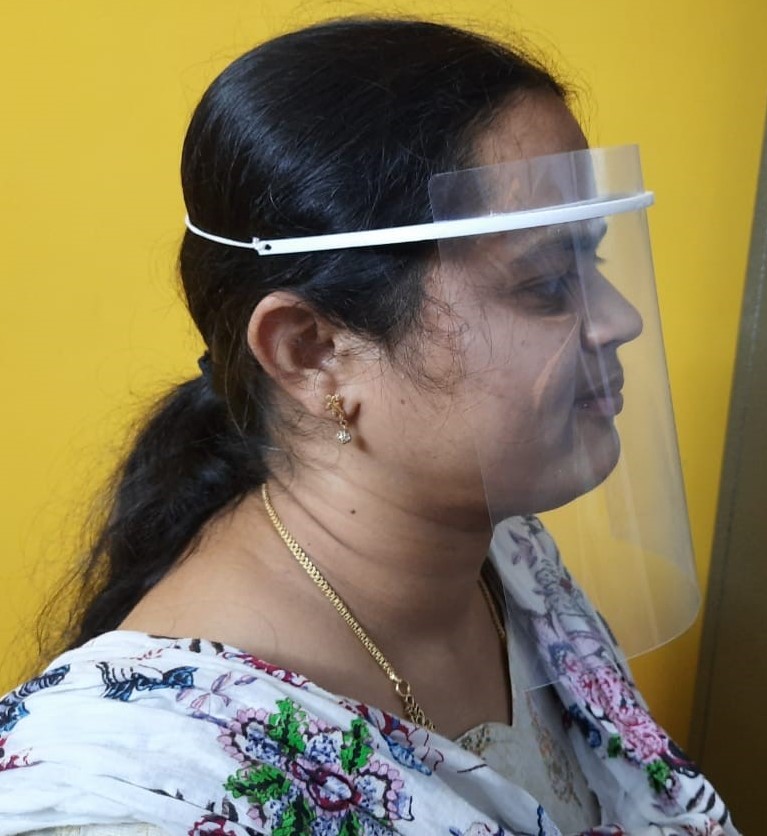 Head mounted Face Sheild
Head mounted Face Sheild
“With the advent of Covid-19, and due to the shortage of personal protective equipment, the health workers such as Doctors, Sanitary staff and Police are also getting infected. As they are the backbone of the society, I thought of designing a light weight Face Shield using 3D Printing (3DP) or Additive Manufacturing technique. The rudimentary advantages of 3D printing technology is the design flexibility and less lead time to manufacturing. “, explains Dr. Jayaprakash.
 Creation of CAD model
Creation of CAD model
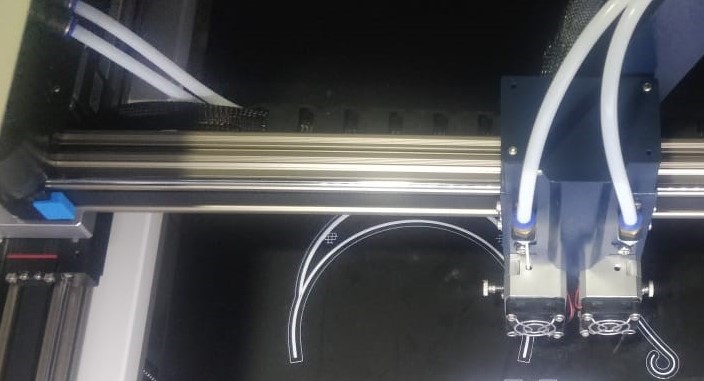 3D Printing
3D Printing
The regular masks barely cover the nose and mouth, whereas the Face Shield will be able to protect the eyes, mouth, nose, and ears so that one cannot get infected by the virus. Some of the medical and police personnel who use the regular masks suffer from facial irritation, making the Face Shield a comfortable and more effective alternative for all government officials on Covid-19 duty.
 Physical component
Physical component
Dr. Jayapraksh further says, “While manufacturing the Face Shield, 3D printing technology is used for designing a headband, upon which a 100 micron thick transparent plastic sheet is attached to ensure superior protection against the virus. It prevents air, dust, and liquids that are contaminated to come in contact with people. Also, there are no probable side effects on using the mask. If the government approves of its marketing, the face mask can be distributed among the public to prevent the widespread of Novel Coronavirus.”
 OHP sheet assembly
OHP sheet assembly
The management of SRM AP, Andhra Pradesh applauds Dr. Jayaprakash on designing the mask after relentlessly working on it for several days. Prof. Narayana Rao, Pro Vice-Chancellor of the University, has written to Adimulapu Suresh, Minister of Education, Andhra Pradesh, and Alla Kalikrishna Srinivas, Deputy Chief Minister of Andhra Pradesh, Minister for Health, Family Welfare and Medical Education, Andhra Pradesh, highlighting the importance of the facial cover and the many ways it can be regarded as a boon to the society as a whole. He said that the Face Shield would be beneficial to millions of students who would be attending regular classes once the educational institutions reopen.
- Published in Mechanical Engineering NEWS, News, Research News
Young Engineer’s endeavour to fight COVID-19: Developed “Face Shield 2.0”
During the unprecedented crisis, when the world is slowly falling into despair, the talented students of SRM University- AP are using the time for brainstorming and innovation. Attesting the signs of a true researcher, P. Mohan Aditya, a 2nd – year Mechanical Engineering student, represents the future generation well by developing a highly useful face shield that costs less than a plate of snacks.
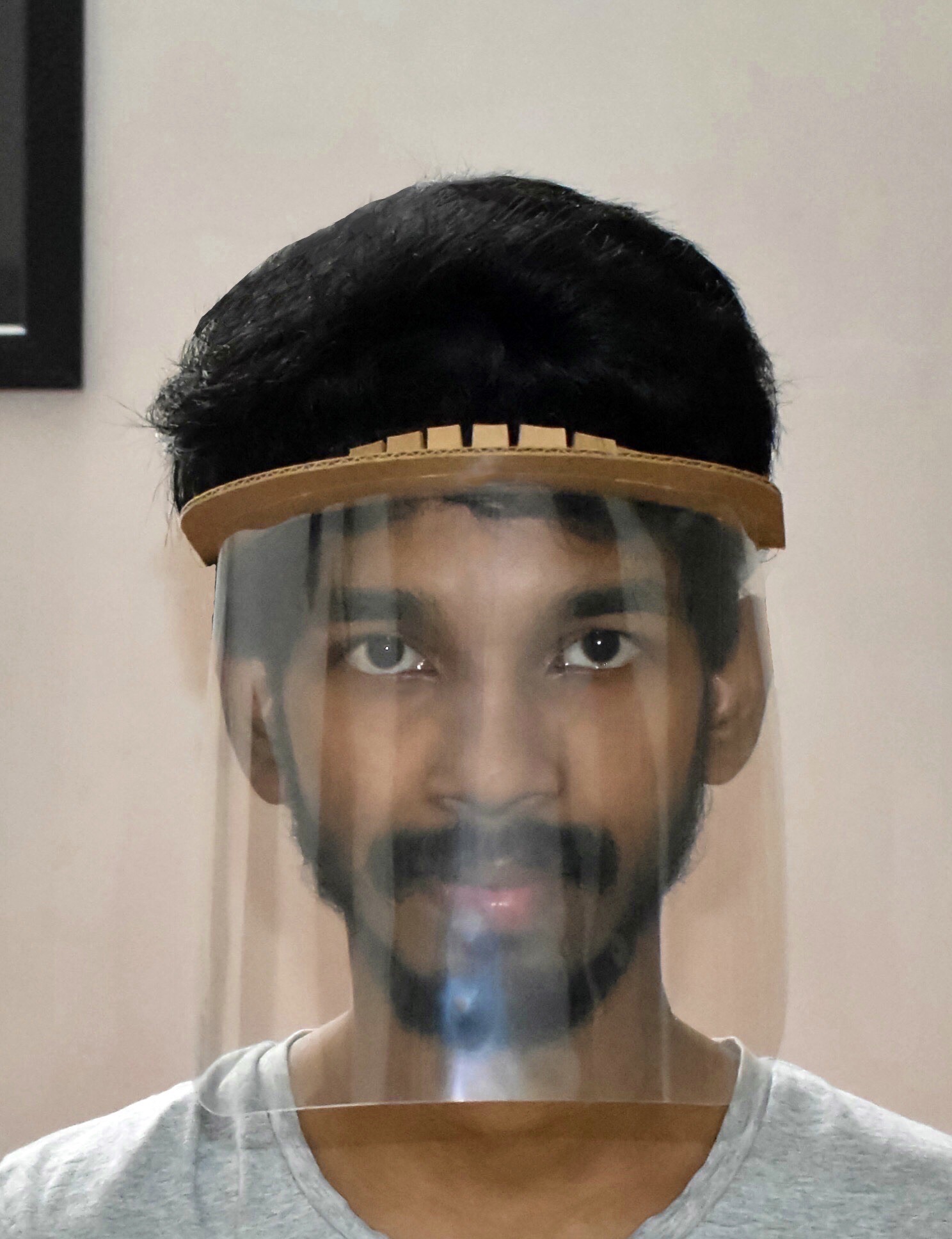 Aditya with his ‘Face Shield 2.0’Mr Aditya has named it “Face Shield 2.0”. The face shield is very lightweight, easy to wear, comfortable yet durable. It protects a person’s entire face from hazards with a thin layer of transparent plastic film that serves as an outer defence. It is a protective equipment to guard the face against exposure to the potentially infectious materials. This face shield is biodegradable as the headband is made of cardboard(paper) which is 100% degradable material and the plastic can be reused. The Face Shield comes only at a price of INR 15.
Aditya with his ‘Face Shield 2.0’Mr Aditya has named it “Face Shield 2.0”. The face shield is very lightweight, easy to wear, comfortable yet durable. It protects a person’s entire face from hazards with a thin layer of transparent plastic film that serves as an outer defence. It is a protective equipment to guard the face against exposure to the potentially infectious materials. This face shield is biodegradable as the headband is made of cardboard(paper) which is 100% degradable material and the plastic can be reused. The Face Shield comes only at a price of INR 15.
The Face Shield 2.0 was manufactured using the CNC (Computer Numerical Controlled) machine through which Aditya designed a headband, and the shape of the transparent plastic film was created using CAD (Computer-Aided Design) software. “I gave this CAD model as an input to the CNC machine. Now the CNC machine software analysed the CAD model and started to cut the cardboard and transparent sheet according to the drawing provided as an input. Thus, I managed to bring down the production time for manufacturing and assembling the Face shield in less than 2minutes,” explained Aditya. A 3 Ply Corrugated Cardboard Sheet had been used in making the headband so that the headband becomes durable, comfortable and lightweight. The Bursting Strength of the Cardboard sheet is 16kg/sq.cm. A thick 175-micron transparent plastic sheet has been placed over the headband to protect the person against the virus. This also forms a barrier that keeps people from easily touching their faces. The transparent film also helps in allowing the visibility of facial expressions and lip movements for speech perception.
 CNC Machine
CNC Machine
The other innovative features of the face shield are – a cushioning type of structure has been attached to the headband so that the person wearing it for a long time does not get strained. This structure helps the person to wear the face shield comfortably. By providing the elastic band to this face shield, any person with different head circumferences can wear it easily.
Wearing this ‘Face Shield 2.0’ will help the police, medical personnel, municipal workers, people working in sanitizing department, people working in the essential goods sector by not getting infected by the virus. It can also be used by virus-infected patients so that the chance of spreading the virus to a healthy person can be decreased. Moreover, several lakhs of students of schools, colleges and universities could use the Face Shield 2.0 when they come back to the educational institutions after the lockdown is lifted.
 Machine processing a cardboard Mohan Aditya always wanted to make a difference. So, when he read in many articles and newspapers that there is a huge shortage of the PPE (Personal Protective Equipment) in the world, the idea of making a face shield crossed his mind. “I thought to make a face shield which is 100% biodegradable, low in cost and also gives protection to the facial area and associated mucous membranes (Eyes, Nose, Mouth) which are the possible entries for a virus to infect people,” said Aditya.
Machine processing a cardboard Mohan Aditya always wanted to make a difference. So, when he read in many articles and newspapers that there is a huge shortage of the PPE (Personal Protective Equipment) in the world, the idea of making a face shield crossed his mind. “I thought to make a face shield which is 100% biodegradable, low in cost and also gives protection to the facial area and associated mucous membranes (Eyes, Nose, Mouth) which are the possible entries for a virus to infect people,” said Aditya.
Mohan Aditya wants to be a successful engineer in life. He is very passionate about making useful gadgets. His previous endeavour with his team successfully ended up in making an Electric bicycle by using a 24V 250Watt DC motor powered a 12V and 12Ah battery. At present, they are working on the retrofit of an old IC Bike into brand new Electric Bike. Our young engineer P. Mohan Aditya truly one of those people whom the future world can rely upon.
- Published in News, Students Achievements
Achieving dreams through depicting freedom
Using spices, SRM AP student creates a life-size painting to win the Guinness World Record title
Tatineni Sreya, a first year Electronics and Communication Engineering student of SRM University AP, Andhra Pradesh, became the cynosure of all eyes at the Tech Fest held at the university campus in September 2019.
 Life-size painting using spicesCoinciding with the valedictory session of a two-day Tech Fest hosted by the university’s management at the campus, Sreya attracted eyeballs by painting on a 588 square feet canvas in a span of 4 hours and 15 minutes using spices (turmeric powder and vermilion). The feat was recorded in the presence of a panel of jury to claim a place for Sreya in the Guinness Book of World Records. On Wednesday, her painting reached the pinnacle when the Guinness World Records Committee sent an e-mail to the university ownership announcing that the title has been awarded to Sreya. The Cherian Committee has broadcasted that the World Records will be awarded in recognition of the wellbeing of the student. The World Record title certificate will be issued soon.
Life-size painting using spicesCoinciding with the valedictory session of a two-day Tech Fest hosted by the university’s management at the campus, Sreya attracted eyeballs by painting on a 588 square feet canvas in a span of 4 hours and 15 minutes using spices (turmeric powder and vermilion). The feat was recorded in the presence of a panel of jury to claim a place for Sreya in the Guinness Book of World Records. On Wednesday, her painting reached the pinnacle when the Guinness World Records Committee sent an e-mail to the university ownership announcing that the title has been awarded to Sreya. The Cherian Committee has broadcasted that the World Records will be awarded in recognition of the wellbeing of the student. The World Record title certificate will be issued soon.
Sreya started the painting of a little girl standing on a cliff and absorbing in the beauty of the rising sun, at 11.30 a.m. and concluded the act exactly at 3.45 p.m. “The painting is about a girl rejoicing freedom mimicking my emotion after I was done with my stressful high school days. While dealing with the pressure at school, I wanted to prove that zeal and passion can steer one to achieve monumental achievements. “, explains Sreya.
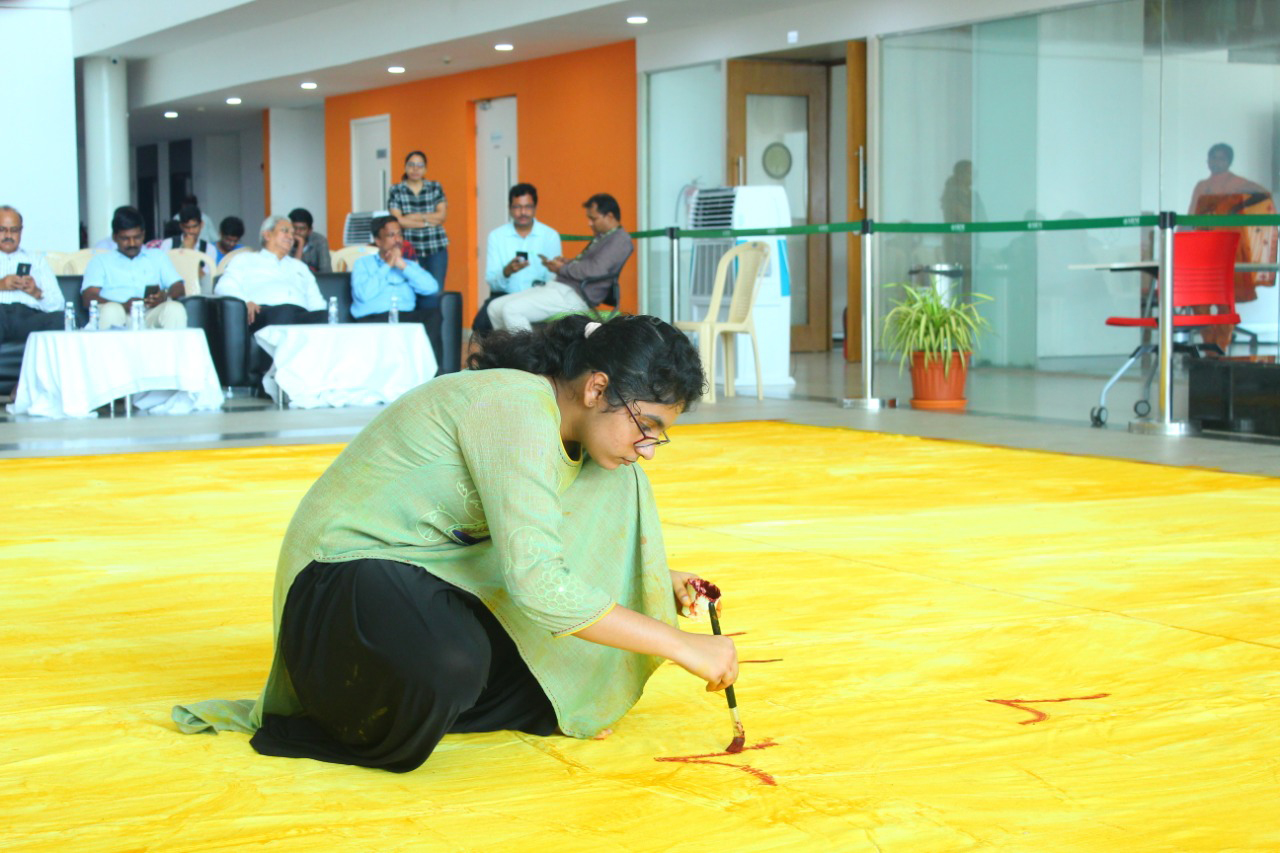 Sreya working on the painting
Sreya working on the painting
Sreya applied to Guinness Book of World Records in January when she was preparing for her high school finals and was searching for a UG college to get into. Sreya narrates, “I finally got into SRM AP in June and was adjusting to the new surroundings and environment when we had a Tech Fest meeting. We were asked to speak about ourselves. I informed my fellow students and the professors regarding my application to Guinness Book of World Records and knack for painting. It was proposed by one of the faculty members during a meeting that I should attempt on the painting during the Tech Fest. Although it was challenging to balance academics, Tech Fest activities, and other club activities, along with gearing up for the attempt, I was able to build upon the planning in a short span of time with my parents and friends supporting me.”
On the culminating day, Architect T. Ramakrishna, after measuring the exact size of the painting and other aspects stipulated by the Record Book, recorded the ‘surveyor’s statement.’ K. Manohar from Vijayawada Food Testing Laboratory analyzed and certified the products used in the painting while Police Officials P.V.R.K. Prasad and Ravi, Chartered Accountant Krishna Reddy and Advocate Rami Reddy, sat through to witness the act and made their observations.
 Sreya’s successful attempt Immediately after she finished the painting, Sreya’s friends greeted her with cheers and lifted her on their shoulders. On Wednesday, the Tech Fest Committee 2019 proudly declared, “One of our committee member Sreya Tatineni’s attempt for Guinness World record is successful. She won the Guinness world record in Largest Spice painting.” Dr. Sathyanarayanan, the President of the University, Prof. Narayana Rao, Pro Vice-Chancellor, and Dr. D. Gunasekaran, Registrar congratulated Sreya for this efficacious attempt. Dr. D Gunasekaran applauds Sreya saying. “Ms Sreya Tatineni has secured an immaculate place in the Guinness World Records for the largest spice painting done during the Techfest 2019. Special thanks to her parents. SRMAP is proud of Sreya. Thanks to the Techfest Organizing Committee 2019 for making this happen.”
Sreya’s successful attempt Immediately after she finished the painting, Sreya’s friends greeted her with cheers and lifted her on their shoulders. On Wednesday, the Tech Fest Committee 2019 proudly declared, “One of our committee member Sreya Tatineni’s attempt for Guinness World record is successful. She won the Guinness world record in Largest Spice painting.” Dr. Sathyanarayanan, the President of the University, Prof. Narayana Rao, Pro Vice-Chancellor, and Dr. D. Gunasekaran, Registrar congratulated Sreya for this efficacious attempt. Dr. D Gunasekaran applauds Sreya saying. “Ms Sreya Tatineni has secured an immaculate place in the Guinness World Records for the largest spice painting done during the Techfest 2019. Special thanks to her parents. SRMAP is proud of Sreya. Thanks to the Techfest Organizing Committee 2019 for making this happen.”
Sreya says “I was in happy tears after my attempt was done as I got the picture that I planned of. My family, friends, and my professors at SRM AP were very supportive and encouraged me in all the phases related to this attempt. To be honest, receiving this humongous award from Guinness Book of World Records is the proudest and happiest moment of my life till date. Getting into Guinness Book of World Records is never a small thing. It will be one of the biggest days in my life that I will cherish forever. In the future, I hope to make an attempt at something different.”
- Published in News
Online adaptive fast output voltage tracking in DC power supply system
Remarkable research of Dr. Tousif Khan N is honoured with APJ Abdul Kalam Memorial International Travel Award
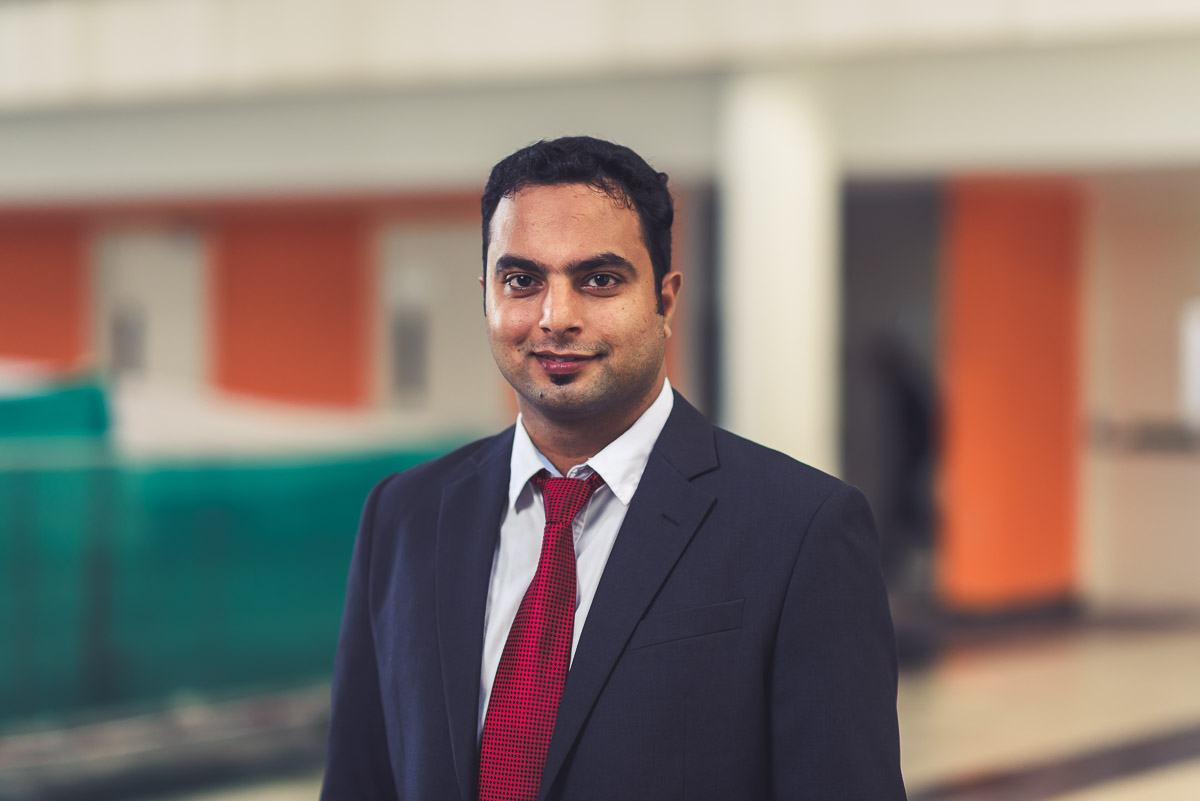 SRM University AP, Andhra Pradesh faculty, Dr. Tousif Khan N, Assistant Professor and Head of the Department, Department of Electrical and Electronics Engineering, is to present a paper “Laguerre Neural Network Driven Adaptive Control of DC-DC Step Down Converter” in the renowned International Federation for Automatic Control (IFAC) World Congress to be held in Germany during July 12-17, 2020. Further this research article is also selected for the prestigious APJ Abdul Kalam Memorial International Travel Award by the Automatic Control and Dynamic Optimization Society (ACDOS) chaired by Professor Ravi Gudi of Indian Institute of Technology Bombay.
SRM University AP, Andhra Pradesh faculty, Dr. Tousif Khan N, Assistant Professor and Head of the Department, Department of Electrical and Electronics Engineering, is to present a paper “Laguerre Neural Network Driven Adaptive Control of DC-DC Step Down Converter” in the renowned International Federation for Automatic Control (IFAC) World Congress to be held in Germany during July 12-17, 2020. Further this research article is also selected for the prestigious APJ Abdul Kalam Memorial International Travel Award by the Automatic Control and Dynamic Optimization Society (ACDOS) chaired by Professor Ravi Gudi of Indian Institute of Technology Bombay.
The research work of Dr. Tousif proposes a novel Laguerre neural network estimation technique for the approximation of unknown and uncertain load function, followed by its subsequent compensation in the adaptive backstepping controller. A detailed design of the proposed estimator and adaptive backstepping controller along with closed loop asymptotic stability have been presented. Further, the proposed control mechanism is evaluated through extensive numerical simulations while subjecting the converter to input voltage, reference voltage, and load resistance perturbations. Furthermore, the results are verified by testing the proposed controller on a laboratory prototype with DSP based TM320F240 controller board. The analysis of results reveals that the proposed control methodology for DC-DC step down converter offers a faster transient output voltage tracking with smooth and satisfactory inductor current response over a wide operating range. Dr. Tousif informs, “Under the class of DC-DC converters, the dynamics of DC-DC step down converter are nonlinear in nature and are largely influenced by both parametric and unanticipated external perturbations. In its closed loop operation, obtaining a precise output voltage tracking besides satisfactorily inductor current response is a challenging control objective. Hence, in this regard, this article proposes a solution.”
Electric power supply is the principal entity behind any electrical circuits and systems. Irrespective of their function in the digital domain, these circuits necessarily require a reliable and efficient energy source for their operations. Among the two existing forms of electrical energy, namely, the direct current (DC) and the alternating current (AC), the DC power finds wide use in numerous applications in the field of telecommunication, instrumentation, medical electronics, aerospace, defence and power transmission.
Ever since the fundamental innovations in DC systems by Thomas Alva Edison in 1880, DC rectification, and modulation method have remained central to various utilities. During the initial years, DC power conversion primarily resorted to the use of vacuum tube technology in delivering a desirable level of voltage from an AC source. The rectification stage was subsequently followed by filtering of the voltage at the output end. Nonetheless, the vacuum tube technology supported very low current density and featured a high ripple content in the DC voltage. Additionally, the output voltage was inconsistent or rather unregulated, making it inappropriate for DC power operated electrical and electronic systems. Much later in 1967, integrated series regulators were developed which eventually became popular as linear power supplies (LPS). Such a classical DC power generation method involved an AC transformer, AC-DC rectifier, and a voltage regulator in its assembly. The transistors in LPS operate under active region and dissipate large amounts of heat due to the voltage drop while high current flows through the collector-emitter junction, thereby causing substantial power loss and a very low energy efficiency. Even though they characterize the low level of noise and find better suitability in audio applications, yet their critical limitations of huge size, heavy weight and high cost make them infeasible for use in portable electronic devices.
In tandem to these aforementioned developments, the advancements in power semiconductor technology led to the invention of low cost reliable power switches exhibiting fast switching response. This proved to be instrumental in building an energy efficient switched mode power supply which gradually gained popularity. “Its impact on electrical technology was phenomenal, replacing conventional linear voltage supplies with switched mode power supplies giving rise to enhanced efficiency, light weight, compactness, and comparably lower cost. Such a modern DC conversion system primarily includes DC-DC converters, wherein the rectified input voltage is fed to the DC-DC converter circuits for obtaining specific voltage levels. The primary objective in DC-DC converters is to transfer the energy among different DC circuits functioning at a specific voltage and current levels. This process of energy transfer is performed by temporarily storing the energy from the input source in an operating mode, followed by releasing it in the other operational mode of the converter. Thus, one level of DC input voltage is converted to another level of average DC output voltage at the load end. Meanwhile, the converter being ideal is expected to consume no energy. Any consumption of energy in the converter interface amounts to direct power loss in the overall supply system. Typically, converters render high input-output conversion.”, enlightens Dr. Tousif Khan N. His notable research work offers to mitigate these issues, leading to the venerated APJ Abdul Kalam Memorial International Travel Award. Advancing his work in the future, Dr. Tousif will be closely working on the society’s activities with ACDOS as a member for mutual benefit.
- Published in Departmental News, EEE NEWS, News, Research News


